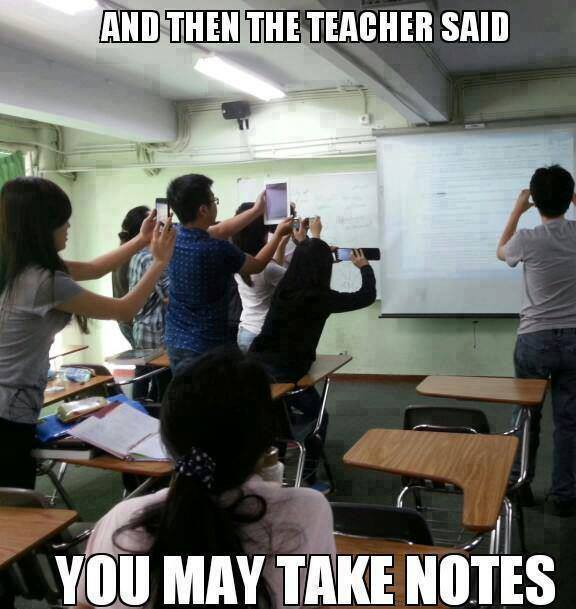Although I have seen this picture before, I saw it tweeted again recently:

Although this seems like a no-brainer as a method to quickly capture information, there is also the challenge that if you want to “retain” information, writing it down is a much better method. In an article titled “Want to retain information? Take notes with a pen, not a laptop”, the author shares the following:
To examine the possible advantages of longhand note taking, researchers from Princeton and UCLA subjected students to several TED Talks and then – after a break featuring “distractor tasks” designed to disrupt memory – quizzed them on their recall of the content. Students were equipped with either (internet-free) laptops or paper notebooks while they watched the talks and instructed to take notes as they normally would for a class. Test questions included both factual recall (names, dates, etc.) or conceptual applications of the information.
Because the quantity and quality of notes have been previously shown to impact academic performance, students’ notes were also analyzed for both word count, and the degree to which they contained verbatim language from the talks. In general, students who take more notes fare better than those who fewer notes, but when those notes contain more verbatim overlap (the mindless dictation issue) performance suffers. As one might expects, students who watched the TED Talks equipped with laptop were able to take down more notes, since typing kicks hand-writing’s butt in terms of speed. However, the luxury of quick recording also resulted in the typed notes having significantly more verbatim overlap than the written ones, and this was reflected in test scores. While, laptop and longhand note takers both fared similarly on factual questions, those taking the tedious pen-and-paper notes had a definite edge on the conceptual questions. So while laptops allowed students to generate more notes (on average a good thing), their tendency to encourage writing down information word-for-word appeared to hinder the processing of information.
So one is easier and much less time-consuming, and one seems to improve the ability to “retain” information and be able to share it back. So which one is better for learning?
How about neither?
The ability to simply obtain information and recite it back is not necessarily learning as much as it is regurgitation. I might better be able to retain the facts shared, but it doesn’t mean I understand them. On the other hand, if I am taking a picture, putting it in my camera roll, and doing nothing with that information, then really, what good is that?
What is important here is how you make your own connections for deep learning. Taking a picture is obviously much less time-consuming (why would not just give the information over in the first place?) than writing notes, so with the extra time, the ability to do something with the information is where the powerful opportunities for learning happen. For example, taking this picture and writing a blog post on it will help me more than simply retweeting the picture in the first place. When I speak, I try to challenge people to create something with the information I have shared, whether it is writing a blog post, reflection, podcast, video, or any other type of media. If they really want to process what I have shared, they will need to make their own connections, not the connections I have made for them.
Having easy access to the information is great, but what we do with it is what really matters.
“The world only cares about — and pays off on — what you can do with what you know (and it doesn’t care how you learned it).” Thomas Friedman